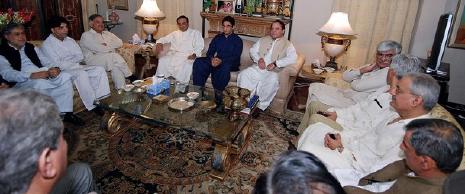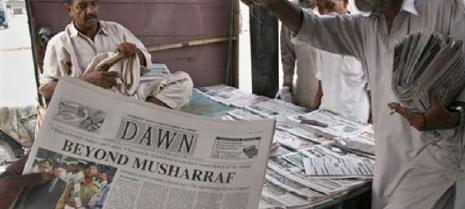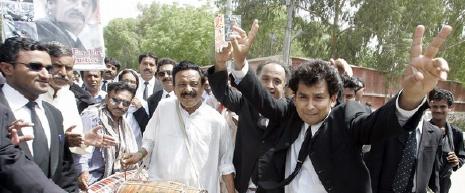Adil Najam
One of the most important decision in Pakistan’s political history was made yesterday when Gen. Pervez Musharraf was made to resign from the Presidency. Equally, and possibly more, important decisions are being made right now by the political leadership of the ruling coalition. It is these decisions being made now that will ultimately effect not only the immediate but the long-term future of the country and which will, in many ways, determine the real significance of the decision made yesterday.
As the political leadership of the country continues its deliberations four questions in particular seem critical. The answers they come up will will impact what happens to Pakistan politics as well as what happens to Pakistan’s political leadership itself.
On each of the following four key decision points, what do you think will happen? What do you think should happen?
![]()
Question #1. Who will replace Gen. Pervez Musharraf as President of Pakistan?
The names being thrown around, some I think less seriously than others, include those of Afsaryab Khattak, Afsandyar Wali Khan, Fazlur Rahman, Dr Fehmida Mirza, Aftab Shaaban Mirani, Faryal Talpur, Attaullah Mengal, Saeeduz Zaman Siddiqui, Mehmood Achakzai, Aitizaz Ahsan, Rana Bhagwandas, Fakharuddin Ibrahim, and many others. As important as the choice of the President is the signal it will send about whether the nature and powers of the President will also be cut down or not. What do you think will happen? What do you think should happen?
Question #2. Will Chief Justice Iftikhar Chaudhry and his fellow judges be restored? And when?
The really important question here is the “when”. PML(N) wants the judges to be restored immediately. If they are not, what signal will this send to the PML(N) and the country about their role and power within the ruling coalition? What, really, are the pros and cons of an early restoration, and for whom? The one question that may be even more important than the “when” question here, is the “under what conditions” question. That is the question one hears less about but will may ultimately determine what comes, or does not come, out of the judges moevement. What do you think will happen? What do you think should happen?
Question #3. What is the future of the ruling coalition itself?
The ruling coalition was really constructed as a coalition against Gen. Musharraf. Its primary purpose was to remove Gen. Musharraf from office. It has been spectacularly successful in doing that. What now? Will it survive? In what form? Should it survive at all? Will it be more healthy if PML(N) now becomes a parliamentary opposition which, in a functioning democracy, is as important as a government? What do you think will happen? What do you think should happen?
Question #4. What about the survival issues of the Pakistani awam: Bijli, Paani, Nokri, Naan?
Ultimately, this is the most important question of all. Till now, with a visibly divided government, the political parties could ward of part of the economic woes faced by ordinary Pakistanis to Gen. Musharraf and his past policies. Now, they will have to – and quickly – demonstrate that they can and will do something about these major crises. It is not clear what they plan to, or even can, do. But if they don’t their popularity will be seriously imperiled. What do you think will happen? What do you think should happen?























































Ahmad, I was hoping for a more analytical and logical repsonse. Are the points I listed false, or not a hurdle to democracy? If so, why?
Sorry, but I must say that I didn’t find much more than judgements and personal insults in your response.
BTW, Faraz, you should try living in a democracy for a little while. You may be pleasantly surprised :-)
Faraz, The answer to your questions is simple. Yes, it can.
In fact, if there was such a country democracy would be all the more important for it because it would be the only way for it to get out of the mess.
And, since you ask. Yes, you are missing something, a lot.
the only thing that is a hurdle to democracy is a small arrogant elite who are believe that only they are smart enough or educated enough and only they are right and everyone else is wrong and do not have faith in the majority of the people. Apart from that, none of the conditions you mention pose any problems for democracy.
A very friendly question to all those chanting slogans of democracy:
Can democracy really work in a country:
> where the feudal system is still widespread
> where people can be easily intimidated (during elections)
> where the literacy rate unfortunately is still very low, and where people are easily deceived and duped
> where only corrupt politicians and their sons rise to power (thus limiting voters to only bad choices)
Can democracy really work under these circumstances? Or am I missing something?
Answers to the 3 questions. Of course I cannot predict the events!
1) President most likely from the PPP. It may even be Zardari and I am not opposed to that. So far, there has been only ONE conviction (in a Swiss court) and that too has been over-turned. Yes, innocent until proven guilt. So quit this ‘10%’ rantings from the 90s: Those who accused him and Benazir Bhutto have themselves admitted to foul-play.
2) Yes, all the judges will be restored. At worst, it could the ‘minus-one’ formula. I also think this NRO threat is bogus: Didn’t Zardari spend 9+ years in jail without ever been found guilty? He was let go by Musharraf in 2004. And if he could survive all that under hostile govts. then why would he be particularly bothered with the central govt. FIRMLY (yes, NS pulling out won’t do much damage) in place? The restoration, of course, will be tied to getting concessions from PMLN.
3) About the ‘coalition’ lasting, I think the chances are much less now. PPP is in a position to form govt. even in the Punjab. All flavors of PML, including PMLN, are notorious for turn-coats. And if NS tries to duplicate what he did to the Benazir Bhutto govt. between 1988-1990 then NS should know that it is full 2 decades later and that the ‘Establishment’ no longer hates the PPP like it until very, very recently.